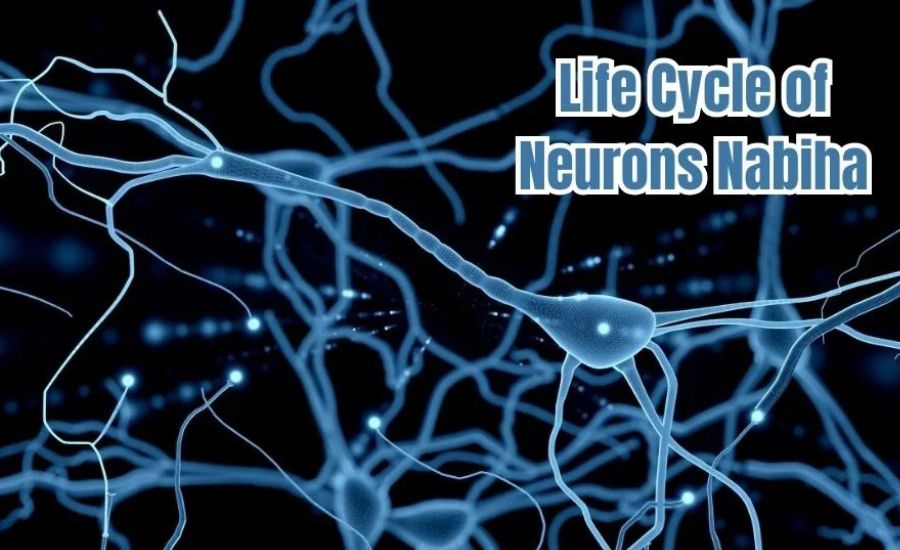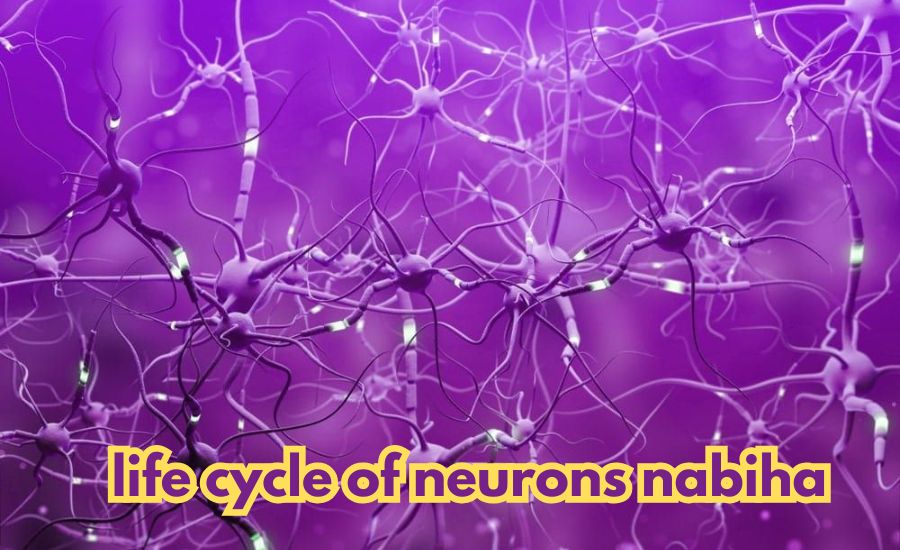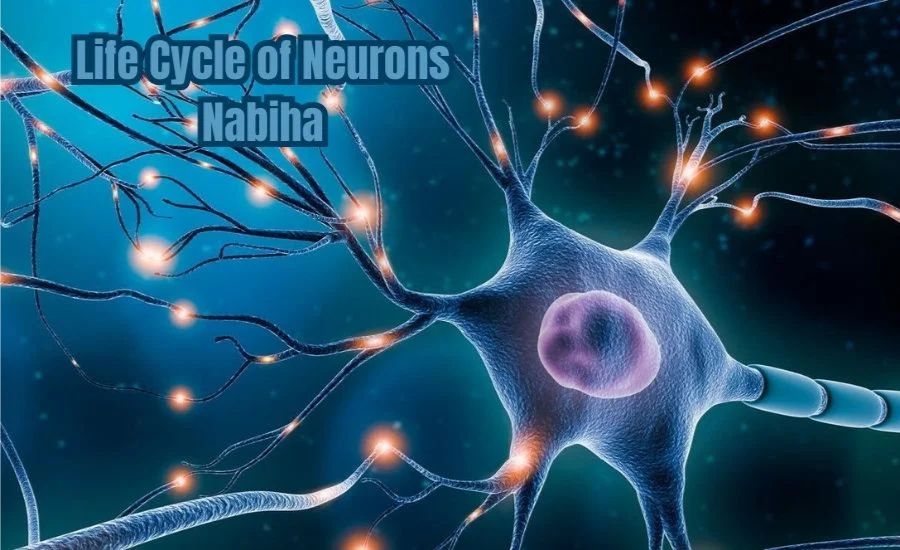The life cycle of neurons nabiha is a fascinating process that begins with neurogenesis, the creation of new neurons, and continues through growth, connection, and maintenance. These fundamental units of the brain play a crucial role in how we think, learn, and remember. Understanding this life cycle is essential for grasping the complexities of brain function and the impact of neurodegenerative diseases.
Neurons are not static entities; they undergo significant changes throughout their existence. The life cycle of neurons nabiha involves various stages, from the formation of neural stem cells to the intricate processes of synaptogenesis and myelination. Each of these stages is critical for maintaining cognitive health and ensuring the efficient functioning of the nervous system. As we explore these stages, we will gain insights into how neurons adapt and thrive, and what happens when this delicate balance is disrupted.
The Proliferation Phase: How Neurons Are Born
In the first stage, neurons are born from stem cells. This process is called proliferation. Stem cells are special because they can turn into different types of cells. When they divide, some of them become neurons. This happens mainly during the early stages of life, like before birth.
After neurons are formed, they start to grow. They reach out and connect with other neurons. This is very important because these connections help them communicate with each other. The more connections they life cycle of neurons nabiha make, the better they can send messages. Proliferation is crucial for developing a healthy nervous system, especially in young children.
Differentiation: The Specialization of Neurons
Once neurons are born, they enter the differentiation phase. In this stage, neurons begin to specialize and take on their specific roles. Some neurons will become sensory neurons, which help us see, hear, and feel things. Others may become motor neurons, which help us move our muscles. This specialization is essential for our brain to work correctly.
Differentiation allows neurons to develop unique features. For instance, sensory neurons have special parts that can detect light or sound. As they specialize, they form unique shapes and connections that help them perform their jobs better. Understanding this phase of the life cycle of neurons is vital for recognizing how our bodies respond to different stimuli.
Maturation: The Journey to Fully Functional Neurons
After differentiation, neurons mature. This maturation phase is where neurons grow longer and develop more connections. They form a network that helps them communicate more effectively. As neurons mature, they become better at transmitting signals across the nervous system.
During this time, neurons also strengthen their connections with other neurons. Strong connections lead to better communication and faster signal transmission. Maturation is essential for learning and memory. When we learn new things, our neurons strengthen their connections, making it easier to remember information later.
Apoptosis: The Natural Decline of Neurons
As with all cells, neurons have a life span. The final stage in their life cycle is called apoptosis, where some neurons naturally die off. This might sound scary, but it is a normal part of life. Our bodies carefully manage which neurons to keep and which to let go.
Apoptosis helps the brain maintain balance. When too many neurons are present, it can create confusion and slow down communication. By removing the extra neurons, our brains can work more efficiently. Learning about this stage helps us understand why some neurons die and how it affects our overall health.
Read Next: Tsnico-8
Conclusion: Understanding and Supporting Neuronal Health
In conclusion, the life cycle of neurons nabiha is a complex but fascinating process. Each stage, from birth to death, plays a critical role in how our brains develop and function. By learning about these stages, we can appreciate how important it is to keep our neurons healthy.
Taking care of our brains involves eating well, exercising, and staying mentally active. By supporting the life cycle of our neurons, we can help ensure that our brains remain sharp and functional throughout our lives. Understanding how neurons work gives us the tools to promote better brain health and improve our overall quality of life.

Introduction to the Life Cycle of Neurons Nabiha
The life cycle of neurons nabiha is an exciting topic that explains how neurons develop and function in our brains. Neurons are special cells that help send messages throughout our body. They play a crucial role in everything we do, from moving our muscles to thinking and feeling emotions. Understanding the life cycle of neurons helps us learn more about how our brains work and what happens when neurons become unhealthy.
Neurons have a fascinating journey. They start as tiny cells and go through several important stages. Each stage is essential for creating a healthy brain. By exploring these stages, we can find ways to keep our brains healthy and functioning well throughout our lives. This knowledge is especially important for scientists and doctors who study the brain and work to treat neurological diseases.
Overall, the life cycle of neurons nabiha provides valuable insights into brain development. Knowing how neurons are born, grow, and sometimes die helps us understand the brain’s overall health. This understanding is key to developing new treatments for brain-related conditions, making it essential for both individuals and the medical community.
Factors Affecting the Life Cycle of Neurons Nabiha
Many factors can influence the life cycle of neurons nabiha. These factors can either help neurons grow and thrive or hinder their development. Some of the most significant factors include:
- Genetics: Our genes play a crucial role in determining how our neurons form and function. Some people may inherit genes that make their neurons stronger or more resilient, while others may have genes that pose challenges.
- Environmental Influences: The environment around us can impact our brain health. Exposure to toxins, poor nutrition, and lack of exercise can negatively affect neuron growth and function. A balanced diet rich in vitamins and minerals is essential for nourishing our neurons. Regular physical activity also supports brain health by promoting blood flow and oxygen to the brain.
- Experiences and Mental Stimulation: Engaging in activities that challenge our minds, like puzzles or learning new skills, can help strengthen neuronal connections. Positive experiences can lead to neurogenesis, the process of creating new neurons. Conversely, chronic stress or trauma can harm neurons and hinder their growth.
Understanding these factors is crucial for maintaining healthy neurons and a vibrant brain.
Neurogenesis and Its Importance in Brain Health
Neurogenesis is the process of forming new neurons in the brain. It is an essential part of the life cycle of neurons nabiha. This process primarily occurs during early development but can also happen in specific brain areas throughout life. Neurogenesis plays a vital role in maintaining brain health and function.
New neurons are crucial for learning and memory. When we learn something new, our brain creates new connections between neurons. These connections help us remember information better and adapt to new experiences. By encouraging neurogenesis, we can enhance our brain’s ability to learn and retain information.
Factors that promote neurogenesis include:
- Physical Exercise: Regular exercise increases the production of new neurons in the hippocampus, a brain area associated with learning and memory.
- Healthy Diet: A diet rich in omega-3 fatty acids and antioxidants can support neurogenesis.
- Mental Challenges: Engaging in challenging mental activities encourages the growth of new neural connections.
By understanding the importance of neurogenesis in the life cycle of neurons, we can take proactive steps to improve our brain health.

Neuroplasticity: Adapting Through the Life Cycle of Neurons
Neuroplasticity is the brain’s ability to adapt and change throughout life. This remarkable process allows the brain to reorganize itself by forming new connections between neurons. The life cycle of neurons nabiha is closely linked to neuroplasticity, as it enables the brain to learn and recover from injuries.
When we learn something new, our brain’s neurons create new pathways. This ability to adapt is vital for learning, memory, and even recovery from brain injuries. For example, if someone has a stroke, the brain can sometimes rewire itself to compensate for lost functions. This process shows how flexible and resilient our neurons can be.
Several factors influence neuroplasticity. Engaging in challenging mental activities can promote neuroplasticity by encouraging the growth of new neural connections. Social interactions and physical exercise are also beneficial, as they stimulate brain activity and promote overall brain health. By understanding neuroplasticity, we can harness its power to improve our cognitive abilities and support recovery from brain-related issues.
Implications of Neuronal Life Cycle in Neurodegenerative Diseases
Understanding the life cycle of neurons nabiha has important implications for neurodegenerative diseases. Conditions like Alzheimer’s, Parkinson’s, and Huntington’s disease involve the degeneration and death of neurons. By studying the life cycle of neurons, researchers can identify how these diseases affect neuronal development and function.
In neurodegenerative diseases, the normal processes of neuron growth and maintenance become disrupted. For example, in Alzheimer’s disease, the accumulation of harmful proteins leads to neuron death, impacting memory and cognitive function. By learning more about the life cycle of neurons, scientists can develop new therapies to protect neurons from damage and promote healthy growth.
Moreover, understanding neurogenesis and neuroplasticity can lead to innovative treatment approaches. Therapies that stimulate the growth of new neurons or enhance neuroplasticity may help improve brain function in individuals with neurodegenerative diseases. This knowledge empowers researchers and healthcare professionals to create strategies that support brain health and improve the quality of life for those affected by these conditions.
Faqs
Q: What is the life cycle of neurons nabiha?
A: The life cycle of neurons nabiha refers to the stages that neurons go through, from their development in the brain to their eventual decline or death. This includes processes like neurogenesis (the birth of new neurons), growth, maintenance, and apoptosis (natural cell death).
Q: Why are neurons important?
A: Neurons are essential because they transmit signals throughout the body, enabling communication between different parts of the brain and the rest of the body. They are crucial for functions like movement, sensation, and cognition.
Q: What is neurogenesis?
A: Neurogenesis is the process of creating new neurons in the brain. It mainly occurs during early development but can also happen in certain areas of the adult brain, playing a vital role in learning and memory.
Q: How does neuroplasticity relate to neurons?
A: Neuroplasticity is the brain’s ability to adapt and change by forming new connections between neurons. It allows the brain to learn, recover from injuries, and reorganize itself based on experiences.
Q: What factors can affect the life cycle of neurons?
A: Factors that can impact the life cycle of neurons include genetics, environmental influences (like nutrition and toxins), and life experiences (such as mental stimulation and stress).
Q: What is apoptosis in neurons?
A: Apoptosis is a natural process in which neurons undergo programmed cell death. This is important for maintaining a healthy balance of neurons in the brain and ensuring that the remaining neurons can function effectively.
Q: How can we support our neuronal health?
A: We can support neuronal health by eating a balanced diet, exercising regularly, staying mentally active, and managing stress. These habits can promote neurogenesis and neuroplasticity, keeping our brains healthy.
You May Also Like: Usnowadays










